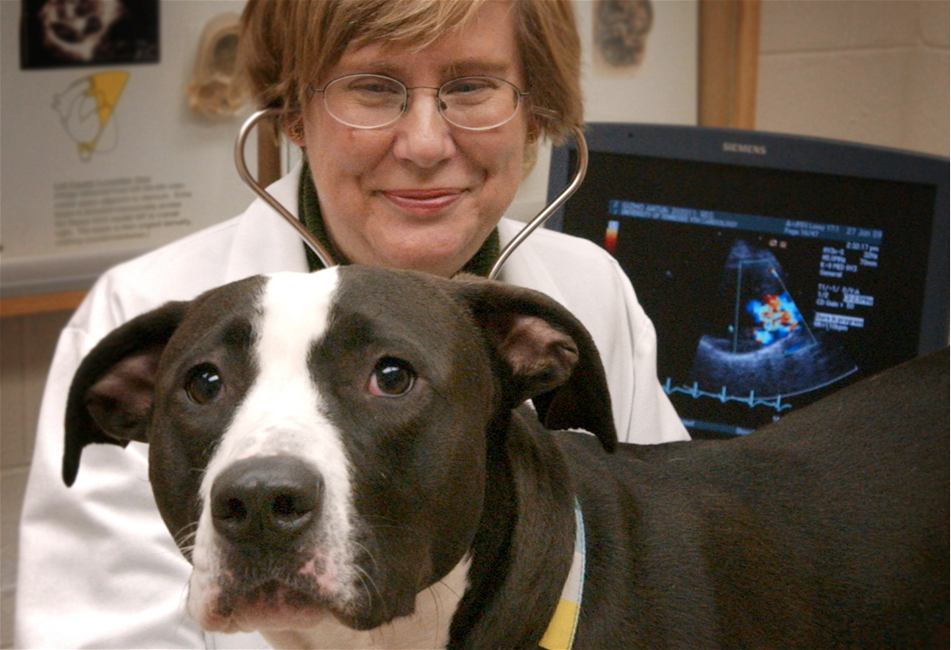

Search Help
Enter a country to search internationally or a city/state or zip to search within the US. If you select a country it will search only within that country. If you select only a state it will only search within that state. If you search for a zip code or city/state combo it will search within a proximityWhat is a Board-Certified Veterinary Cardiologist?
A Veterinary Cardiologist is a specialist that has advanced training in the heart and circulatory system.
To become a Board-certified Veterinary Cardiologist, a veterinarian usually completes a one year internship followed by extensive specialized training in an approved residency training program (usually 3-5 years). Most Veterinary Cardiologists work with small animals; however, some specialize in large animals, including horses and cattle.
What conditions do Veterinary Cardiologists treat?
Board-certified Veterinary Cardiologists focus on diagnosing and treating diseases of the heart and some lung conditions, which include:
- Congestive heart failure (CHF)
- Heart muscle disease (Dilated cardiomyopathy or hypertrophic cardiomyopathy)
- Age related changes to the valves of the heart (Degenerative mitral valve disease)
- Coughing and other breathing problems
- Congenital (present at birth) heart defects
- Cardiac arrhythmias (problems with the rate and/or rhythm of your animal’s heart)
- Diseases of the pericardium (sac surrounding the heart)
- Cardiac tumors
- High blood pressure (hypertension)
- Pulmonary hypertension (high blood pressure in the lungs)
Veterinary Cardiology Specialists will perform a complete and thorough physical examination on your animal, and based on these initial findings, additional tests will be discussed. They will also review your animal’s past history and current medications. Depending on your animal’s condition, diagnostic testing or treatments may include:
- Echocardiography (sonogram) – non-invasive ultrasound imaging of the heart
- Electrocardiography (ECG) – non-invasive electrical reading of the heart’s rhythm
- Blood pressure evaluation
- Holter monitor – 24 hour ECG performed at home
- Radiography (x-rays) of the chest and lungs
- Surgical repair of congenital heart defects
- Cardiac catheterization procedures
- Balloon valvuloplasty to dilate narrowed valves
- Pacemaker implantation for animals with too slow of a heart rate
- OFA Heart Registry Certification for breeding programs
How do Veterinary Cardiologists work with your primary care vet?
Board-certified Veterinary Cardiologists are an integral part of your animal’s health care team from the time a potential cardiac abnormality is noted. Early diagnosis and appropriate therapy of cardiac conditions helps your animal live a longer and healthier life. They work closely with your primary care veterinarian to ensure your animal’s optimal health. While some cardiac conditions require hospitalization, most conditions can be managed on an outpatient basis by a Board-certified veterinary cardiologist along with your primary care veterinarian.
Many Veterinary Cardiology Specialists practice in veterinary teaching hospitals or large referral clinics and are contributing to clinical research programs that aim to improve the cardiac health of animals. Veterinary Cardiology research is essential to identify new diagnostic tests and treatments for cardiac conditions in animals and even humans.
Veterinary education is also important to the Veterinary Cardiologist. From training veterinary students to providing continuing education courses to veterinarians and to training future board certified cardiologists, cardiology specialists are often involved in improving veterinary knowledge and understanding of the cardiac and circulatory conditions.
...
Find a Board-certified veterinary cardiologist using our search tool!
Edited by:
Rebecca Saunders, DVM, DACVIM (Cardiology)
April, 2020
